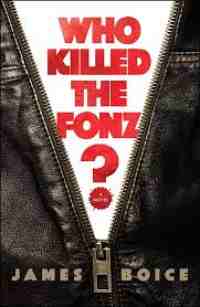
Published by Simon & Schuster on February 19, 2019
Who Killed the Fonz? is simple, amusing, a little schmaltzy, and somewhat predictable. In other words, it’s like a typical episode of Happy Days.
Richard (no longer Richie) Cunningham has grown up. He has a wife and children. Joanie and Chachi are still in Milwaukee. His father has died but his mother moved to the LA area and lives with him. He is a screenwriter who, despite an Oscar nomination, is widely seen as washed up. Nobody wants to make the movie he’s been working on for three years. His agent is giving him a chance to write a movie called Space Battles (a Star Wars knockoff with blood and boobs), calling it Richard’s last chance.
On the day he gets that news, he learns that Fonzie crashed his motorcycle into a guardrail and plummeted into a river. His body was not recovered but his funeral has been scheduled. And so Richard goes back to Milwaukee, attends the funeral with Potsie and Ralph, and pokes his nose into Fonzie’s mysterious death. He also meets a friendly fellow who is running for governor and gets (he hopes) a career jumpstart by writing and directing the guy’s campaign commercial. The candidate and his wife, of course, were great fans of Fonzie, who had a lot of admirers despite being a loner who refused to abandon his greaser image.
Fonzie, the story tells us, was always true to himself, in many ways helping Richie find the courage to be who he wanted and needed to be. To thine own self be true is the novel’s theme, although spoken in Fonzie’s voice. So this simple story teaches a simple lesson just like a Happy Days episode. That’s not all bad.
I won’t say anything about the mystery surrounding Fonzie’s death or the other plot elements. I could complain that the ending is predictable, but this is the kind of book that, like a Happy Days episode, demands a predictable ending. I will say that an appreciation of the story demands a familiarity with the television series. It wouldn’t be meaningful for a reader to think about Richie’s adult life or his relationship with Fonzie without having seen some episodes, a few of which the novel describes.
I don’t remember when I stopped watching the show (it was before the 10-year run ended), and I have to admit that the only described episode I remember involved Fonzie locking a burglar in a closet. Fonzie was more memorable than the plots, at least to me. That might be true of this book, as well. The plot is amusing but it primarily serves as a vehicle for bringing Fonzie back into the lives of readers who watched Happy Days 40 years ago (or younger readers who watched it in reruns).
Fonzie is a television icon and the characters in the novel remember him in an idealized way — “the tough guy with impeccable virtue, the philosopher with grease-covered hands, the lone wolf whose loyalty to those he considered a friend was unbreakable” — the way in which icons deserve to be remembered. Like most Happy Days episodes, Who Killed the Fonz is pleasant but forgettable, while reminding us that Fonzie was one of the most entertaining television characters to emerge from the 1970s.
RECOMMENDED